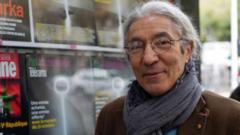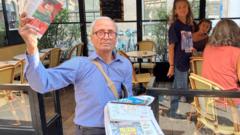The case highlights tensions between Algeria and France, as well as issues regarding free expression in North Africa.
**Boualem Sansal: 80-Year-Old Algerian Author Imprisoned Over Controversial Remarks**

**Boualem Sansal: 80-Year-Old Algerian Author Imprisoned Over Controversial Remarks**
An Algerian court sentences the writer to five years for comments on Morocco, sparking international outcry.
Boualem Sansal, an 80-year-old French-Algerian author, has been sentenced to a five-year prison term by an Algerian court for allegedly undermining the country’s territorial integrity. His remarks came during a November interview with a far-right French media outlet, where he claimed that France, during the colonial period, allocated too much land to Algeria and insufficiently to Morocco. Additionally, he stated that the contentious region of Western Sahara had historical ties to Morocco.
Since his arrest, Sansal has been hospitalized due to health issues, raising concerns among supporters regarding his wellbeing. Intellectuals and political figures have rallied for his release, including notable personalities such as Wole Soyinka, the Nigerian Nobel laureate, and French President Emmanuel Macron. In a statement earlier this year, Macron described Sansal’s imprisonment as arbitrary, emphasizing the need for resolution on this issue to restore confidence between France and Algeria.
Sansal’s supporters argue that he has inadvertently become a symbolic figure amidst the complicated diplomatic tensions between Paris and Algiers, with an atmosphere of mistrust exacerbated by France's backing of Morocco's claims to Western Sahara. This longstanding dispute has further strained relations following Algeria’s withdrawal of its ambassador to France last year, amidst deteriorating diplomatic ties that have seen Algeria severing relations with Morocco as well.
In the immediate aftermath of the court's decision, Sansal's attorney has appealed to Algerian President Abdelmadjid Tebboune for compassion towards the writer. Known for his staunchly anti-Islamist stance and critique of the Algerian regime, Sansal has been characterized by some as a figure who caters to the prejudices of the far-right. Support for him has come from controversial figures like Marine Le Pen, leader of France’s far-right National Rally party, who commended him as both a champion of liberty and a courageous adversary of Islamic extremism.
Despite his polarizing reputation, Sansal’s literary achievements, including the acclaimed novel *2084* that tackles themes of religious extremism, have garnered him recognition within literary circles. His forthcoming book, *Vivre*, is set for release in May and narrates the journey of an elite group selected to resettle on a new planet as Earth faces impending destruction. The broader implications of his imprisonment resonate beyond literature, touching on vital conversations surrounding freedom of expression and the political landscape of North Africa.
Since his arrest, Sansal has been hospitalized due to health issues, raising concerns among supporters regarding his wellbeing. Intellectuals and political figures have rallied for his release, including notable personalities such as Wole Soyinka, the Nigerian Nobel laureate, and French President Emmanuel Macron. In a statement earlier this year, Macron described Sansal’s imprisonment as arbitrary, emphasizing the need for resolution on this issue to restore confidence between France and Algeria.
Sansal’s supporters argue that he has inadvertently become a symbolic figure amidst the complicated diplomatic tensions between Paris and Algiers, with an atmosphere of mistrust exacerbated by France's backing of Morocco's claims to Western Sahara. This longstanding dispute has further strained relations following Algeria’s withdrawal of its ambassador to France last year, amidst deteriorating diplomatic ties that have seen Algeria severing relations with Morocco as well.
In the immediate aftermath of the court's decision, Sansal's attorney has appealed to Algerian President Abdelmadjid Tebboune for compassion towards the writer. Known for his staunchly anti-Islamist stance and critique of the Algerian regime, Sansal has been characterized by some as a figure who caters to the prejudices of the far-right. Support for him has come from controversial figures like Marine Le Pen, leader of France’s far-right National Rally party, who commended him as both a champion of liberty and a courageous adversary of Islamic extremism.
Despite his polarizing reputation, Sansal’s literary achievements, including the acclaimed novel *2084* that tackles themes of religious extremism, have garnered him recognition within literary circles. His forthcoming book, *Vivre*, is set for release in May and narrates the journey of an elite group selected to resettle on a new planet as Earth faces impending destruction. The broader implications of his imprisonment resonate beyond literature, touching on vital conversations surrounding freedom of expression and the political landscape of North Africa.



















